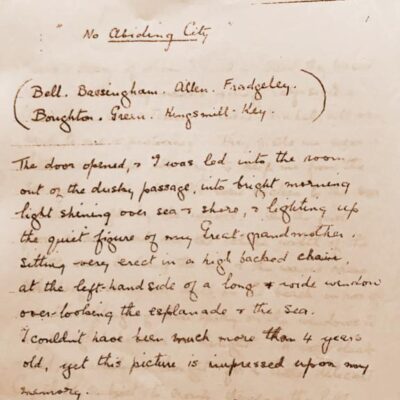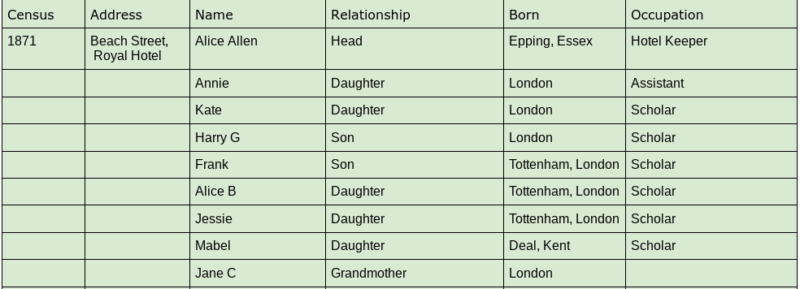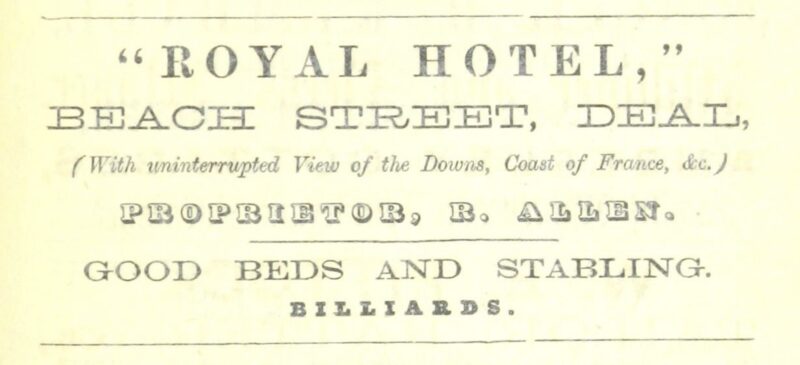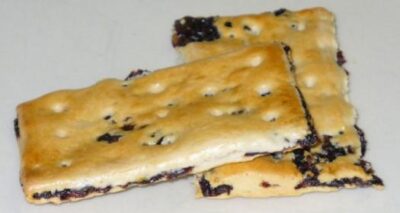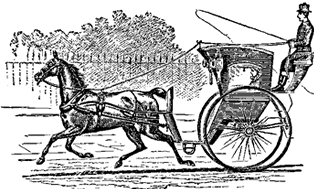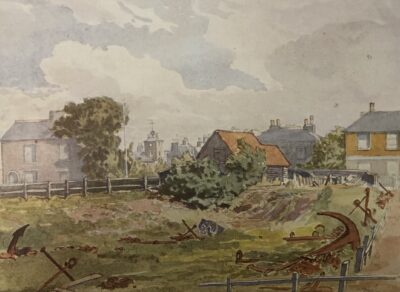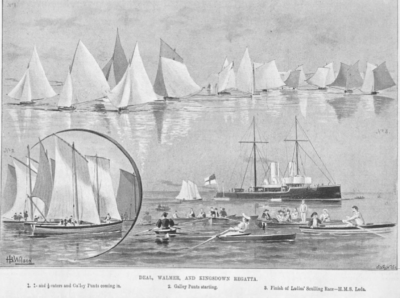Follow us on Facebook @FHofDW
Memories
of
A Young Girl
‘No Abiding City’ is the title of a set of handwritten memories written by an unknown writer. In brackets underneath this title are written the surnames of Bell, Bassingham, Allen, Fradgeley, Boughton, Green, Kingsmill and Key. But which surname was that of our writer’s?
Finding this out took a bit of genealogical detective work. We do know though, from the descriptions of the clothing worn by our writer, that she is a lady.
The first page opens with her remembering herself as a four year old, being led by her mother, into a room with “…bright morning light shining over the sea shore & lighting up the quiet figure of my Great- grandmother sitting very erect in a high backed chair …at a long wide window overlooking the esplanade & the sea…” This room was in the Royal Hotel, and either, she says, the Nelson or Collingwood room which at the time was the family’s private sitting room.
This was a family gathering at which she remembers not only her Great-grandmother but her “..widowed half Grandmama..”, who was her mother’s step-mother, two youths named Frank and Harry “…of whom she “… lived in dread…” and her mother’s younger half sisters Alice, Jessie and Mabel who were “…all very kind and protecting…”
So using this information, and that our writer was visiting her family who appeared to be the owners, or proprietors, of the Royal Hotel, we first looked at the census records. From these we found that, in 1871, a widow named Alice Allen was living and running the hotel. Living with her were her sons Frank and Harry, and daughters Alice, Jessie and Mabel, all of whom had been mentioned by our writer, as well as grandmother Jane C Allen.
As Allen was one of the surnames in brackets at the top of the page this gave us the possible identity of our writer’s immediate family. Jane C Allen was, therefore, the Great-grandmother who “sat very erect in her high backed chair”, and Alice was her “ half-grandmama”.
The whole family as you can see, were all born in the London area, except for Mabel, who was born in Deal. So by finding Mabel’s baptism in Deal, in 1866, we found that her father was Robert Allen and that he was indeed the Innkeeper of the Royal Hotel.
So we now had our writer’s grandfather’s name. With our writer also helpfully giving us her deceased maternal grandmother’s name as Jane Smith, it meant we were able to find her mother’s name which turned out to also be Jane Smith. She married Robert Allen in Southwark in 1846, Robert at this time was a Tobacco Manufacturer. We found him on the 1851 census living in Shoreditch with Jane and their three elder children, Robert, Jane Griffiths and Annie Elizabeth.
Life may have seemed good as Robert’s business enabled him to employ six men and also two servants to help in the house. Sadly this wasn’t to last as sometime soon after the birth of their last child, Kate Mary, Jane died. This left Jane Griffiths at home with Kate while Robert and Annie were possibly away at school.
In 1857 Robert senior married Alice Palmer. From the 1861 census we know that they were living in Tottenham, where he was a licensed victualler, running an old and established coaching house, Three Jolly Butchers. Jane Griffiths was living with them along Kate and their half siblings Henry, Frank and Alice.
As the former proprietor of The Royal Hotel, Hermann Willem Whitlaw, had become bankrupt in early 1865 Robert Allen and his family must have arrived in Deal to take over the running of the Hotel at around this time.
Looking again at the 1871 census we could see that Annie and Kate were living at The Royal Hotel, with their stepmother and half siblings but Jane Griffiths was not, neither was Robert who we found him in Tottenham, as a single man, working for a butcher. So we decided to look at Jane Griffiths next.
Jane Griffiths Allen
Jane Griffiths Allen was born in Shoreditch in 1847. With her distinct middle name we were able to find her marriage to Henry William Bell in St. Leonard’s Church, Deal in 1867. Having these two names meant that we could find their children. These proved to be Eleanor Constance born in 1869, Ethel Jeanie born in 1870, Mabel Marion born in 1872 and Henry Robert born in 1873. Our writer says that she was the eldest grandchild of Robert Allen that being so our writer must be Eleanor Constance Bell.
Eleanor’s Memories
Eleanor paid several visits to Deal over the years and from this first visit she remembers that her young aunts were worried for her health as she was a “…little delicate city child prone to croup…” so they made her wear a warm cape throughout the day. She describes three dresses she had with her too, a rose print frock with a black velvet ribbons and a mottled blue and gold dress made of warm Cheviot Wool. There was also a black velvet frock trimmed with white swansdown and very much the party dress of her choice. Much to her dislike, though, she was made to keep on the warm Cheviot Wool dress which made her feel like a little brown sparrow at the Grand Christmas Party at which she says, “…all the young people of Deal seemed to be gathered together…” at which they all enjoyed the merrymaking with glowing fires in all the rooms and Holly & Mistletoe everywhere.
Her Great- Grandmother, Jane C Allen, who she tells us was a Boughton before she married, was about ninety years of age and kept up a dignified, if not bewildered, presence amongst her big and lively family. Great Grandmother used to sleep in a room at the side of the hotel that had a window that looked out onto a cobbled courtyard or alley. Eleanor says “…you may remember those quaint little courts, each with its old street lamp fixed on a house wall…They are all gone now, swept away in the name of improvement…”
On a much later summer visit to Deal she says that she saw the window to her Great Grandmother now “…cruelly exposed after centuries of seclusion…the southward houses beyond, pulled down, swept away, destroyed and that part of the Royal Hotel basking in sunlight…”
Eleanor it seems was not a fan of the improvements! These being the building of the promenades or esplanades which started in the late 1830s. The aim was to bring prosperity to the town by making it into an attractive ‘Watering Place’ by demolishing some buildings on the seaward side of Beach Street and building a sea wall for the promenades or esplanades to sit upon. Coincidentally the Committee that was to bring about these changes was formed at the ‘Three Kings’, the former name of The Royal Hotel, on February 27 1837.
The Soup Kitchen once stood on Brewer Street. Although Robert Allen’s name does not appear in the Soup Kitchen’s Ledger his granddaughter says that it was well supported by him. And that years later she met a very old man “…who still metaphorically smacked his lips when he spoke of Mr Allen’s soup…”
The Mercury, in December 1865, reported that Robert Allen as the worthy and kind hearted proprietor of The Royal Hotel had distributed 80 basins of soup and a 2lb loaf to the poor of the neighbourhood “..there is no one like him now so good to the poor…” another old gent fondly told Eleanor.
The notable people of Deal, like many of the towns and cities before the welfare state, tried to help those in real need. Deal’s Soup Kitchen was set up in January 1852 at the instigation of Mayor, Thomas Reakes. It aimed to supply “good beef soup” during the winter months and, for 1d, a large chunk of bread. This was initially all paid for by charitable contributions. Committee members would also go around the streets knocking on doors asking for donations. Robert Allen as the proprietor of a large and prosperous Hotel would have been a prime target, and according to Eleanor, a willing one too.
Garibaldi Biscuits
While staying at the Royal Eleanor remembers a walk she took with her young Aunt Mabel. Young because she was just a few years older than herself. They strolled hand in hand, Mabel pushing her doll’s perambulator, down the little esplanade to a small grocer’s shop at the edge of the sea. Here they bought Garibaldi biscuits “..beloved by us both…”. These biscuits were created in 1861 for the Peak Frean company and were commonly known, even today, as the ‘squashed- fly biscuits.’
Omnibuses, Hansom Cabs& Dinners
It seems that in the six years that Robert spent in Deal, before his death in 1871, he made or tried to make an impression on the town. As well as his charitable efforts, he hosted the Mason’s to “…splendid dinners in a first rate style…”, launched an Annual ‘Haunch of Mutton Festival’ and catered for the Mayors dinners, he also took the opportunity to open up the south toll-house of the pier as a refreshment room, he organised rowing matches and promoted an Omnibus route to Ramsgate. Eleanor was also told that as the inhabitants of Deal and had never seen a Hansom Cab before he had one sent down from London and drove it himself down the middle of the pier “…so that all might see…”
Anchors and Dreams
It was after church one morning that Eleanor remembers taking a walk with Alice, her step grandmother. It was on this walk that she saw enormous anchors and figureheads in such numbers that they left an impression on her young mind. There were, she says, the remains of the Naval Victualling Yard before it was built upon to become Victoria Town “…with its grey terraces and the South Eastern Hotel on the corner opposite Deal Castle…”
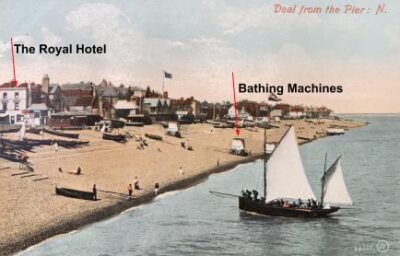 Eleanors was to have a recurring dream, almost a nightmare, of looking up through emerald green waters. This dream had its roots in Deal. When aged about twelve she, and three other youngsters, were bathing early in the morning “…without any attendance…” when she slipped into the “…emerald green waters…” she then an incoming wave pushed her violently to be “…dashed against the ironbound wheel of one of the bathing machines…” somehow she managed to drag herself up the steps of the bathing machine “…unendurably choking…” only to be welcomed by much laughter from her companions.
Eleanors was to have a recurring dream, almost a nightmare, of looking up through emerald green waters. This dream had its roots in Deal. When aged about twelve she, and three other youngsters, were bathing early in the morning “…without any attendance…” when she slipped into the “…emerald green waters…” she then an incoming wave pushed her violently to be “…dashed against the ironbound wheel of one of the bathing machines…” somehow she managed to drag herself up the steps of the bathing machine “…unendurably choking…” only to be welcomed by much laughter from her companions.
She doesn’t say where the bathing machines were that she and her companions were using. Adelaide Baths had already closed but there were several other proprietors of bathing machines in operation then and up until the early 1930s.
Burials & Wills
Great-grandmama Jane died in 1877. She apparently had an extreme fear of premature burial and expressed a wish that she should not be “…laid to rest until all had been made past doubt…” She wanted to be buried in Abney Park Cemetery in Stoke Newington, London, beside her husband, but this wish was disregarded and she was buried, against her wishes, in Hamilton Road Cemetery beside her son.
At the time of Robert’s death, in 1871, he had ten surviving children. The eleventh, Thomas had died the year before aged six. Once the will was read and probate granted Eleanor writes that all the ten children “… took their portions…” However there must have been some expectations from the children of Roberts first marriage as she remembers it said that her grandmother, Jane Smith’s money, was divided between ten instead of just her own five children.
Jane Smith, and her siblings, had inherited money and shares from their father Henry Smith when he died in 1854. Henry was an Oil & Colour man who it seems was quite well off. His will though, does not mention specific amounts or his children by name. Robert, though, is mentioned, as he was one of the trustees and executors of the will.
This must have rankled down the years as Eleanor writes about ‘The Married Women’s Property Act’ “… being too late for the first family…”
Robert was buried on January 24 1871 and was buried in Hamilton Road Cemetery alongside his son Thomas. Their memorial inscription reads
Sacred to the loving memory of Robert Allen who died 19th January 1871, aged 49 years.
And of Thomas John (Tommy), son of the above, who died 7th September 1870 aged 6 years.
“It is the Lord: let Him do what seemeth Him Good”
Alice carried on the running of the Hotel for a few years after Robert’s death. She died at The Royal on October 1 1878, aged 45, she was buried alongside her son and husband.
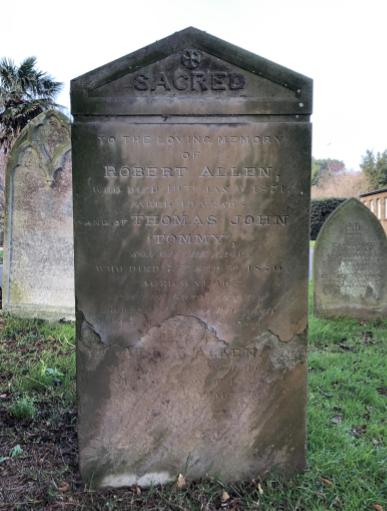 On a much later visit to Deal, in 1927, Eleanor found herself in conversation with an elderly Boatman. On hearing that she was Mr. Allen’s eldest grandchild, he insisted on taking her to see the old stable, tucked away behind Beach Street, and the remains of the loose box, where he tells her, her “…Grandpa used to keep his favourite and the prettiest little pony sledges you ever saw…” He told her of the snowy winters they used to have back then.
On a much later visit to Deal, in 1927, Eleanor found herself in conversation with an elderly Boatman. On hearing that she was Mr. Allen’s eldest grandchild, he insisted on taking her to see the old stable, tucked away behind Beach Street, and the remains of the loose box, where he tells her, her “…Grandpa used to keep his favourite and the prettiest little pony sledges you ever saw…” He told her of the snowy winters they used to have back then.
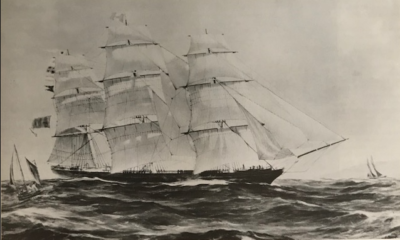
Challenger was a wooden clipper ship built in 1852 by Richard & Henry Green, in their Blackwall Yard for Hugh Hamilton Lindsay, London.
When the Regatta was taking place this same elderly boatman remembers the Allen family sitting on the verandah of the Royal to watch the races. He also remembered helping his father clear up the Royal Hotel’s wine cellars for which he received five shillings. He also remembered the Green and Blackwall line tea Clippers , taking refuge in the Downs with the many other sailing vessels.
Eleanor started out as a mystery to us and she has ended up as so. We can find no definitive records for her after 1901 when she was living with her widowed father in London. We know that in 1927 she was in Deal because it was then that she met with the ‘elderly boatman.’ There are a few Eleanor Constance Bell’s mentioned in the records but, unfortunately, none that we can say is our writer.
